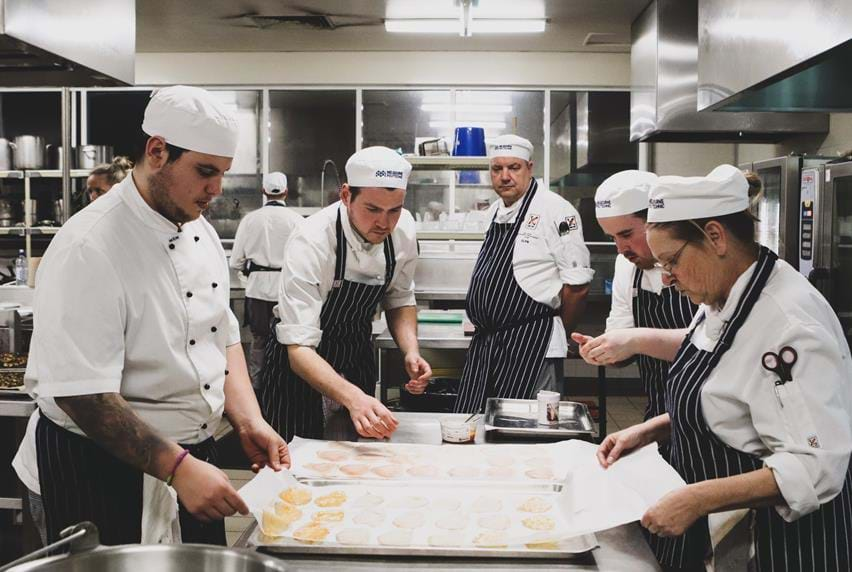Do you enjoy cooking for others, consider yourself somewhat of a foodie, or are you creative with food? Have you given a job in hospitality any thought?
International students frequently choose to study commercial Cookery because of the prestigious culinary schools and hip restaurant culture in Australia, where they may learn from professionals.
Australia’s hospitality industry is competitive, diverse, and has a solid reputation for unique cafés and bars, making it appealing to budding chefs and cafe entrepreneurs. Australians are always astonished and thrilled by what is put on their plates, whether it be new culinary fusions, latte variants, foreign cuisine, etc, all thanks to their competitive spirit and passion for superb food.
In Australia, hospitality workers may advance up the professional ladder and earn a respectable wage even in entry-level positions. Working in a fast-paced setting like a kitchen or restaurant necessitates having high intrapersonal and communication skills since employees must be able to think quickly and collaborate. Hence, international students can enrol in courses like Certificate IV in Hospitality, Diploma of Hospitality Management, Certificate IV in Commercial Cookery, etc.
Continue reading to learn more about the advantages of learning a commercial cookery course, how it may result in permanent residency, and its potential career outcomes.
Is Commercial Cookery A Good Career?
The practice of cooking food for human consumption and producing mouthwatering dishes for other people is known as commercial cooking. The burgeoning culinary sector and upscale restaurants in Australia make mastering commercial cooking a popular alternative for international students.
But is commercial cookery a good career in Australia? Let’s find it out!
Australia is a well-liked choice for international students. The main explanation for this is because the topic, which calls for practical skills, is appropriately taught here.
A well-liked option among students is the one-year, full-time degree known as Commercial Cookery. Here are some reasons why overseas students choose Australia as one of their top destinations.
-
A Spike in the Number of Restaurants
One of Australia’s sectors with the highest labor requirements is food and beverage services. The need for experienced cooks has increased along with the number of restaurants that have popped up as a result of social growth and a busy lifestyle.
Therefore, enrolling in a commercial cookery as a pathway to get PR Permanent residency in Australia.
-
Networking
Commercial cooking offers you several networking chances in the food sector in addition to teaching you about cooking techniques.
In order to finish your commercial cookery course, you must complete a required work placement. Afterwards, you will also be required to go through the hiring process. So it makes sense to interact with the right individuals.
-
Higher Employment Chances
More work chances are closely correlated with being in the hospitality industry. You will have many excellent options as an international student to start your first professional job in the kitchen as you finish your commercial cooking degree.
You will also have a number of choices inside the market. Additionally, there will be no restrictions on your growth, so you may start in a tiny restaurant and climb the ladder to 5-star hotels.
-
High Income
Undoubtedly, when they get qualified for a given profession, people search for positions with greater salaries. You will be able to get higher-paying work in the hospitality sector, which is one of its finest features.
Cooks in Australia make an average of $57,250 per year or $29.36 per hour. The starting salary for new hires is $48,757 annually, with the majority of seasoned professionals making up to $68,250 annually. Chefs earn an average of $1250 per week working full-time, compared to $1460 for other occupations.
-
No Restrictions
There won’t be any restrictions on you showcasing your innovative abilities when you seek a profession in commercial cooking. You are dedicated to what you are doing, therefore it won’t take you long to advance quickly.
Alternatively, you may quickly establish your own business and develop your own unique menu. In a few years after graduating, you may reach the top of the kitchen.
After getting sufficient expertise, you can even decide to go it alone as Australia has a huge need for creative new cafes and restaurants.
Types of Courses, Career Pathways, Salaries, and More!
We in Australia are really fortunate to have a thriving sector for cooks. Numerous people have already achieved great things through their commercial cooking careers, from celebs to the head chefs of internationally known Australian restaurants.
But fame doesn’t show up immediately. The most accomplished executive chefs will attest that there is a ladder to be climbed. The good news is that highly driven cooks have the opportunity to advance their careers quickly because there are so many options accessible in Australia’s hospitality sector.
Let’s examine the many culinary positions that can be found in commercial cooking facilities and how your career may go from one to the next.
-
Commis Chef
Average Salary: $21.27 per hour
It’s most probable that a recent commercial culinary graduate would land their initial job as a commis chef or line cook. This is a junior job that normally reports to a chef de partie and is assigned to a certain location. As the demands of the cook vary during the period of their employment, commissioned chefs may travel about the kitchen. This enables students to obtain training in a variety of specialties, such as pastry, sauce, or seafood. A commis chef could be able to advance to the post of first commis or demi-chef de partie as their expertise grows and train to become a full chef de partie.
-
Chef De Partie
Average Salary: $53k
A chef de partie will be knowledgeable about all aspects of the kitchen, but they will have a specialty area they are in control of. Depending on their location, a chef de partie will have a more specific title, such as saucier (for sauce) or entremetier (for entrees).
A chef de partie’s duties as a station leader increase to include managing the station’s food production. Additionally, the chef de partie could be in charge of mentoring commis chefs, making sure the meal is uniform across all plates and maintaining safety and sanitation conformity at their station.
-
Sous Chef De Cuisine
Average Salary: $57k
The sous chef, often known as the “under” chef, usually serves as the executive chef’s deputy. A sous chef is not restricted to any one station; instead, they supervise the entire kitchen and serve as a liaison between the head chef and every station. As a result, they must be a great leader with outstanding communication abilities in addition to being an accomplished and competent chef.
Additional duties for a sous chef often include managing inventories, creating meals with the head chef, and making sure staff members are properly trained.
-
Chef De Cuisine
Average Salary: $62k
The chef de cuisine, sometimes referred to as the head chef, holds one of the top positions in a restaurant kitchen. The main duties of head chefs will involve supervision and go much besides food preparation. These will frequently include communicating with other parts of the business, such as the front of the house. They often work under the direct supervision of the restaurant manager or owner and contribute significantly to the ongoing success of the enterprise by increasing kitchen profitability.
-
Chef Executive
Average Salary: $80k
Although the terms “executive chef” and “head chef” are occasionally used synonymously, the former term more frequently designates a particular position that is only present in really big organisations. Usually found in hotels or restaurant chains, executive chefs are in charge of several establishments. The executive chef has a managerial function in a variety of establishments, guaranteeing consistency in quality and managing marketing and public relations initiatives.
Details on the Commercial Cooking Course
Enrol in a course that blends classroom and hands-on instruction to get your career in commercial cookery began. There are various specialised cooking schools in Australia, as well as degrees from Skilled Up and other professional colleges.
Working part-time at a restaurant or coffee shop while you are a student might also be advantageous if you want to increase your chances of getting a full-time job when you graduate. The following are some related courses:
-
Certificate III in Commercial Cookery
Develop the essential practical cooking abilities and knowledge before starting your commercial cooking career. The practical and theoretical skills and competencies you will need for your profession in commercial cookery are provided by a Certificate III in Commercial Cookery.
It is crucial to pick the right college since it lays the groundwork for your career. The Skilled Up’s Certificate III in Commercial Cookery course combines theory-based classroom teaching with practical training to equip you for the demanding requirements that accompany working in restaurant kitchens.
2. Certificate IV in Commercial Cookery
You may study people management, inventory management, and financial management in the upper-level Certificate IV in Commercial Cookery course.
You can be sent to extra training by the institute officials. For those who are keen on management courses and associated skills, the Certificate IV in Commercial Cooking is a great course.
It will satisfy your ambition to engage in the food industry and teach you the fine skill of managing inventory and employees.
3. Diploma of Hospitality Management
If you have completed the Commercial Cookery Certificate Courses, you may continue with the Diploma of Hospitality Management. Students will get the knowledge and abilities necessary to start their own café or restaurant.
The main benefit of the course is that it is going to prepare you for a professional path that will allow you to build a prosperous hotel industry career.
4. Certificate III in Hospitality
By giving you a strong basis of operational abilities, the nationally recognised Certificate III in Hospitality equips you for a job in the quick-paced hospitality sector.
You will receive training in this course to become a function host, barista, food and beverage assistant, or gaming attendant.
5. Certificate IV in Hospitality
Your hospitality abilities will be improved while leadership and customer service are prioritised in the internationally renowned Certificate IV in Hospitality. You will be prepared to lead with assurance and rise to the position of manager or team leader in the exciting and fast-paced hospitality industry.
List of Top 5 Colleges to Enrol in Commercial Cookery Course in Australia
1. Skilled Up
This is a nationally recognized training organization that helps students make their careers in the commercial cookery course in Australia. It provides Certificate III in Commercial Cookery Course to make the students’ job ready in various professions. With face-to-face and online teaching, this course at Skilled Up can be completed in 44 total study weeks, depending upon the students’ behavior and performance.
So, if you are thinking about where to study commercial cookery courses in Australia, Skilled Up is one of the best institutes.
2. William Angliss Institute
With the Certificate III in Commercial Cookery Course, develop a solid foundation in hospitality. You will be prepared to work in hotel management in a variety of areas, from daily operations to service quality, thanks to this certification. Participate in well-known events like the Spring Racing Carnival and the Melbourne Food and Wine Festival while you are a student at William Angliss.
3. Le Cordon Bleu
Le Cordon Bleu, which has over 35 institutions in 20 countries and has been in business for 125 years, has a great reputation for teaching French cuisine when you are seeking a career as a pastry chef or chef. Three main areas of research are as follows:
Cuisine: You will study the core abilities and information of traditional French cuisine while pursuing Certificate III in Commercial Cookery.
Patisserie: Certificate III in Patisserie is a thorough training course in traditional French pastries. You can become an event manager, HR manager, or manager of business development with a master’s degree in the international hospitality industry.
4. ICHM (International College of Hotel Management)
Learn the fundamentals of business management and a wide range of hospitality fields by enrolling in the Bachelor of Business (Hospitality Management) at the International College of Hotel Management in Adelaide. This makes it possible for graduates to have a variety of job options.
Six months of study and six months of work-integrated training are the standard at ICHM, either in Australia or maybe abroad.
5. Australian Professional Skills Institute
Get practical experience necessary to prepare them for the actual world of cheffing through a blend of theoretical and practical instruction.
Both Certificate III in Commercial Cookery and Certificate III in Patisserie are offered by the APSI and may be finished in one year of full training. Only a Certificate IV in commercial cooking or patisserie will add six more months to your course of study in each area.
Conclusion
Study Cookery & Hospitality Courses in Australia. Kick-start your Cookery & Hospitality Career and get on the Pathway to PR! Get in touch with us.



